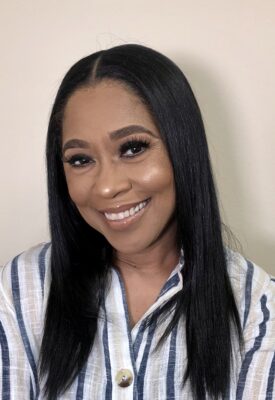A Delicate Tapestry
After serving 14 years in the military, Cynthia’s worsening PTSD led her into an opioid addiction. Through years of recovery involving rehab, faith, and storytelling, Cynthia found her saving grace.

Story
In the process of losing my mind, I found my purpose and my place.
I joined the Army in 1990 and served 14 years. Towards the end of my service in 2003, I was diagnosed with post-traumatic stress disorder, depression, anxiety disorder, and military sexual trauma. Over the next five years, my condition declined and I became addicted to opioids. I entered detox and rehab in 2008. I have required mental health treatment on and off since then, including multiple stays in the North Carolina Veterans Affairs hospital—on the mental health floor—between 2014 and 2019.
I was afraid to be alone; I didn’t feel strong enough to be alone.
I would usually go back to my apartment when I left the hospital. Each time, everything in my home would look different and feel different. I was afraid to be alone; I didn’t feel strong enough to be alone. The apartment would seem smaller, gloomy, the colors dull. I couldn’t believe I had lived there. The brightest thing there would be the color of my plants. Even the sunshine seemed a dull yellow.
And I would often wake up afraid. Afraid that I would disappoint myself and my children and those in my support system that would believe in me no matter what happened.

When I was discharged from the hospital in 2014, I had to move in with my younger children because I needed someone to monitor me. I had to change medications a lot, and the withdrawals were a bit much to deal with by myself. I would fall often and couldn’t transport myself or prepare my own meals.
At first it was too loud. I was living life unfiltered for the first time after more than two years.
In the hospital, I was always asleep or very sedated, now I could hear everything. It was hard to sleep, but the birds chirping in the morning made me smile. I had slowed down long enough to enjoy the small things in life.
Eventually I would pray, get myself together, and do what I had to do each day. I would spend my days at 12-step recovery meetings, doctor’s appointments, therapy sessions, and counseling with my pastor. I knew it was important to keep up with the good habits I’d developed in detox and rehab. So I tried to eat healthily, exercise, and rest.
I eventually worked my way back to church and became an active, full-time member. It was all a lot of work, but it was worth it. I worked very hard to push against the steady stream of stigma that came from my siblings and the rest of my family. But the few church members who knew about my recovery treated me the same as they treated everyone else.
It felt like I had stopped the world and gotten off—catching up and getting back on was hard.
Things moved slowly for me. It felt like I had stopped the world and gotten off—catching up and getting back on was hard. Eventually I did. But I had to make my environment conducive to my healing. I had to take my time and heal properly. I continued seeing my therapist and kept other appointments, and I went to church regularly. I eventually stopped going to recovery meetings, but I started studying my Bible more.

I had a few friends, but we were in different places in the healing process. The stronger me had to decide how much my peace was worth to me, instead of its value to the other minds I encountered along my delicate journey of healing. I had to be mindful of how I interacted with these individuals when disengaging from the friendships. I am a very private person. I tried different friendships. I tried talking to different people, but it was hard for me, so I leaned on solitude.
I prayed for what seemed like every day, all day. I listened to God for answers and direction. I knew that God would love me just as I was—there would be no stigma to worry about. I trusted Him with everything I had. At the lowest points in my life, He was there and still is. I have found that sometimes my greatest battles have been invisible, that I have fought for my mind and my heart, and that these battles have been best fought on my knees.
I know that just because my life started one way does not mean it has to finish that way.
It has also been essential to become an active, well-informed participant in my own care. I cannot accept less than full responsibility in my recovery in order to take back my life. This is how I find the courage to rewrite the end of my story. I know that just because my life started one way does not mean it has to finish that way. I owe it to myself and my family to live a stigma- and prejudice-free life, and to give love a chance. And they deserve a chance to live their lives and raise their families as best they can, too.
As survivors, we can help level the playing field in society by offering the truth the best way we know how. Sometimes we must accept the hand we have been dealt, but that doesn’t mean we can’t shuffle the deck at every chance we get. Healing is something we all search for, whether physically, mentally, or emotionally. Healing is the delicate tapestry of miracles that must occur so that we can successfully regain the proper function of important organs like our heart or mind.
About the contributor
Cynthia Fox Everett is a veteran, a life coach, an author, and a member of the National Alliance on Mental Illness. As an advocate for domestic violence survivors, and a survivor herself, she wants to inspire others to find the strength to rewrite their futures.